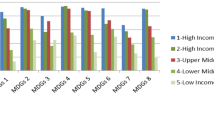Abstract
This article raises a simple question. In the debate between GDP and other indicators of well-being (e.g., MEW, HDI, GNH), it is forgotten that these are all external indicators that purport to privilege different goals as reflective of human welfare. The larger question is whether it is possible to shift the focus of policy from a battle between competing paradigms to a mechanism for eliciting information on well-being directly from the population.
Similar content being viewed by others
Notes
‘While the GDP and the rest of the national income accounts may seem to be arcane concepts, they are truly among the great inventions of the twentieth century’ (Samuelson and Nordhaus, 1999).
This refers to the arcaded courtyard of Palazzo Spada, a 17th century masterpiece of optical illusion, in which diminishing rows of columns and a rising floor create the visual illusion of depth as well as height; an 8 meter long gallery appears to be five times as long, and a 2 foot sculpture at the end of the vista appears to be life size in daylight.
Such articulated critics brought Kuznets to end in 1940 his relation with US Department of Commerce (1999) that had commissioned the studies which later on led to the GDP definition.
References
Easterlin, Richard A. (2001) ‘Income and Happiness: Towards a unified theory’, Economic Journal 111 (July): 465–484.
Frey, Bruno S. and Alois Stutzer (2002) ‘What Can Economists Learn from Happiness Research?’, Journal of Economic Literature 40 (2): 402–435.
Kahneman, Daniel and Alan B. Krueger (2006) ‘Developments in the Measurement of Subjective Well-Being’, Journal of Economic Perspectives 20 (1): 3–24.
Kahneman, Daniel, Alan B. Krueger, David Schkade, Norbert Schwarz and Arthur Stone (2004) ‘Toward National Well-Being Accounts’, American Economic Review 94 (2): 429–434.
Kuznets, Simon (1934) National Income, 1929–1932, pp 1–12. New York: National Bureau of Economic Research.
Layard, Richard (2005) Happiness. Lessons from a New Science. London: Allen Lane.
Nordhaus, William D. and James Tobin (1972) ‘Is growth obsolete?’ Economic Growth. 50th anniversary colloquium V. Columbia University Press for the National Bureau of Economic Research. New York. Reprinted in Milton Moss (ed.) ‘The Measurement of Economic and Social Performance’, Studies in Income and Wealth, Vol. 38, National Bureau of Economic Research, 1973.
Samuelson, Paul A. and William D. Nordhaus (1999) ‘Economics’, Mc Graw Hill 18th ed.
Seers, Dudley (1969) ‘The Meaning of Development’, International Development Review 11 (4): 3–4.
Stewart, Frances (1985) Basic Needs in Developing Countries. Baltimore, MD: The John Hopkins University Press.
Streeten, Paul (1979) ‘A Basic-Needs Approach to Economic Development’, in P. Kenneth Jameson and Charles K. Wilbert (eds.) Directions in Economic Development. Notre Dame: Notre Dame University Press.
Streeten, Paul (1981) First Things First: Meeting basic human needs in developing countries. Oxford: Oxford University Press.
United Nations Development Programme (UNDP) (1990) Human Development Report. Oxford: Oxford University Press.
US Department of Commerce – BEA- Bureau of Economic analysis (1999) ‘GDP: One of the Great Inventions of the 20th Century’, http://www.bea.gov/scb/account_articles/general/0100od/maintext.htm, accessed 5 October 2013.
World Employment Conference (1976) ‘Employment, growth and basic needs: Tripartite World Conference on employment, income distribution and social progress and the international division of labour’, Report of the Director-general of the International Labour Office. Geneva: 12 International Labour Office.
Acknowledgements
We are very grateful to Giorgio Ruffolo for his precious contribution to the birth of this article that owes much to the discussions we had together and to his sharp insights. Naturally, all usual disclaimers apply.
Additional information
Proposals of alternatives often focus on outcome targets (health, education, nutrition), but in fact the process of political participation is far more important and meaningful
Rights and permissions
About this article
Cite this article
Monni, S., Spaventa, A. Beyond GDP and HDI: Shifting the focus from paradigms to politics. Development 56, 227–231 (2013). https://doi.org/10.1057/dev.2013.30
Published:
Issue Date:
DOI: https://doi.org/10.1057/dev.2013.30




